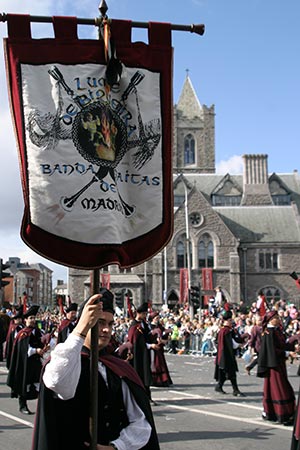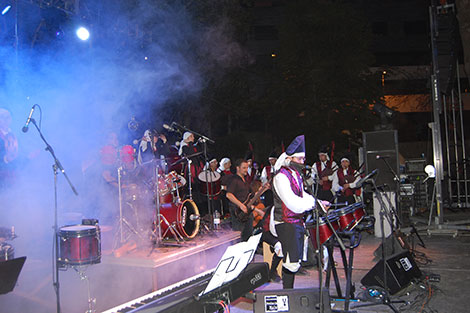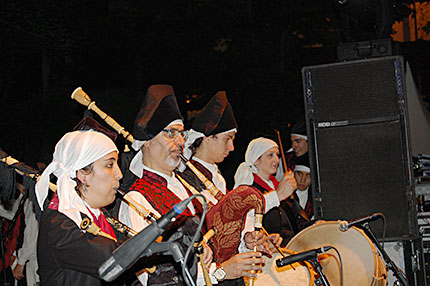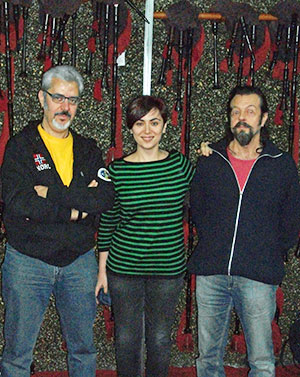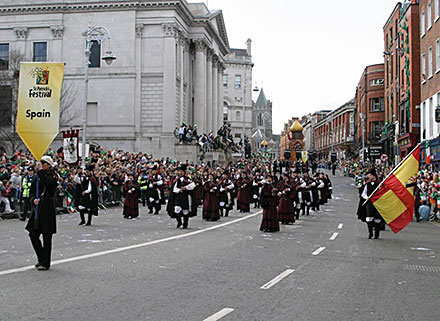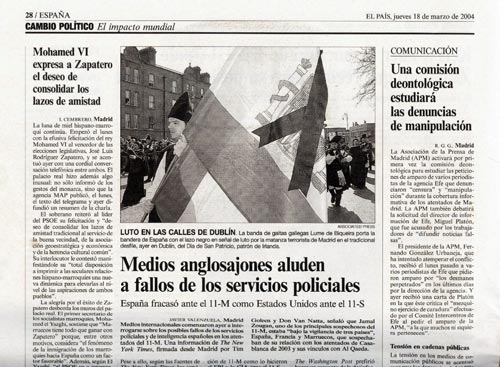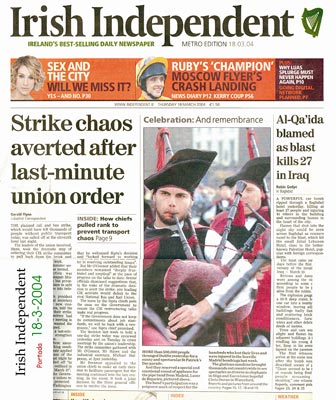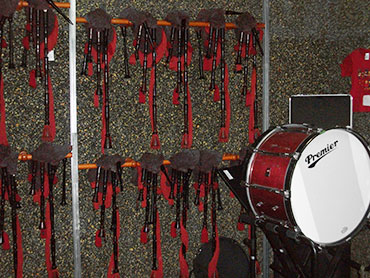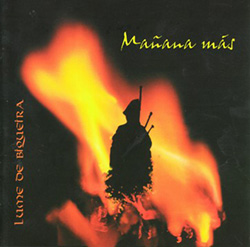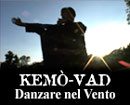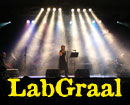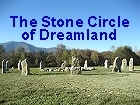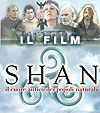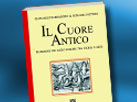| English Page |
Lume de Biqueira, The Galician Pipes that Play at Madrid |
 |
 |
| 24 December 2011 | |||||||||||||||||
“Putting your heart in everything you do is all that matters...”
“Lume de Biqueira” is a band of Galician Gaitas bagpipes) of Madrid. It has participated in National Competitions of Galician Gaitas, always venturing to the top, year after year, until reaching top rank only to head for the championship of this category during various occasions. They also participate as band at the Galician Centre of Madrid; and have crossed the Spanish frontiers three times to take part in the prestigious Dublin Festival of Saint Patrick. Recently, their hands have been full of preparations for an upcoming concert as part of the William Kennedy Piping Festival of Armagh, that began last 18 November in Northern Ireland. I am with Angel Hernando, chair of the association, and Fernando Molpeceres, chief of communications and Gaita master, who I wish to thank for sparing a few moments of time before starting rehearsals in it its studio located at Paseo di Extremadura. You have been playing your gaìtas for over 13 years, first as band of the Galician Centre of Madrid and then as Lume de Biqueira since 2008. Where did the idea to form a band of gaitas in Madrid come from?
Fernando: The regional centers, considered historical, made sense especially in the beginning of the twentieth century to lend support for the immigrants who came to Madrid; and to help them maintain a relationship with their lands. One of the activities taking place routinely regarded their traditional music, although with time – referring to the 80s – 90a - these centers lost some focus of their mission as meeting point mostly due to the development of communicational infrastructure. However, they managed to maintain the groups dedicated to folklore and cultural tradition, at least in the Centro Gallego de Madrid (Galician Center of Madrid) with the group "Rosalia de Castro" which focused on dance and music. What is certain is that the 80s brought with it a lot of interest for Celtic music, bagpipes and Gaitas. This led the Centro Gallego de Madrid to give rise to the formation of a band of gaitas that practiced a marcial (martial) style. An instructor, Professor Dario Nogueira, Gaita Master, was recruited. He had come up in the group Banda Real de la Diputación de Orense (Royal Deputation Band of Orense) and is current leader of the de Lume Biqueira; and so we began to assemble members of the band.
You have helped make Galician music popular throughout these years. The history of the Galician people is undoubtedly linked to musical genres that reflect its customs and character. What are these cultural elements of the Galicians that we come across when listening to the Lume de Biqueira?
Fernando: Folklore stems as functional need in any rural context. There are determined routine tasks in the fields, housework and in the rural world in general that all move in relation to rhythms; and these rhythms transformed into music, which is at times sung and at other times played with instruments. Folklore acts as a remedy to alleviating tedious everyday tasks. Obviously in every area, despite the common ground for all peoples of Europe, a typical folklore comes into being based on the geographical conditions as well as on the level of isolation that this population experiences from other peoples. This is where we can encounter these apparent connections of the Galician peoples with the Atlantic and Celtic worlds, which are - and I insist - only apparent because it is not possible to refer to music as being Celtic in its own right as this entails a “label” used by Anglo-Saxon recording studios. Nevertheless, there are elements that develop among the peoples and enrich this music which in the beginning was strictly functional. The new elements that come into play concern festivities, religious celebration or ceremonies.
Therefore, let's say that there are three branches that accompanied this folklore: religious beliefs and the need to pay homage to Saints, the need to alleviate work, and the need to engage in festivities and personal entertainment. It is this last aspect that has planted its roots in time and spread in ample measure. These three components give rise to the birth of different genres of traditional music. However, there are connections between songs and melodies that are rather similar in Castilian folklore, common rhythms in different parts of Spain, such as Jota, which is rather widespread in the north of Spain, or Passodoble, common to all of Spain. There are also in portent rhythms that can be encountered in different areas of Spain that were imported in the 19th century from Poland, or the Mazurca that can be found both in Spain and in Europe alike. So folklore takes on characteristics through these two elements: connections and isolations. How do all of you manage to keep Galicia alive every day when you're not rehearsing, in concert, or occupied with lessons? What habits have you not forsaken?
Angel: We can’t offer a mystic view on how to maintain this and those traditions and ways of seeing life. The people that come from Galicia, perhaps not the current generation, but their parents and grandparents, maintain a totally natural relationship with these origins through family ties or by means of friendships in their land of origin. Perhaps in large cities such as Madrid they tend to seem diluted. Popular social and cultural events in a city like this tend to lose the sense of how they were born, through which folklore and which place. However, the people that have not lost the roots inherited from their parents or grandparents, in their constant comings and goings, and coming here to play this type of music, keep an undying flame burning. There is no internal “altar”, it is a living relationship.
Aside from concerts, you also currently promote teaching the gaita. What is the most common profile of those approaching you for the first time? What interest moves them?
Fernando: There are many profiles and motives as you can imagine, starting from people who come here because their family is of Galician origin. Or perhaps they themselves are Galician and in a moment of their life they decide to learn how to play the typical instrument of their land because the gaita provokes something that no other instrument of this world is able to do so. In other words, it is the icon of the lands in which it is played; and this instrument-man symbiosis is not found anywhere else. But there are people who also think about Scottish sounds; and the thing that comes closest here is Galician music. I must point out that we are not against including Scottish and Irish compositions in our repertoire. Generally, these are the two main reasons: there are people who have a relationship with Galicia and those who wish to learn to play Celtic music. Perhaps now this request has decreased during the last ten years, given that everything moves in a cyclic manner. It also used to be true that the only way to learn to play a Celtic-like instrument was to play the Galician gaita. Now the city hosts teachers of Irish bagpipe, Irish flute, accordion…and it was once impossible to find something similar in Madrid. I must say, however, that many who approached us interested in Celtic music have taken a fond liking for Galician music, and now love it more than Irish music. They underwent a sort of reconversion because they felt the sentiment: this is a music of sentiments.
Do the people that come to you seeking musical training do so in the name of music, or is there a desire to seek other elements perhaps more closely bound to their culture?
Fernando: They don’t ask that, but that’s what I give them. I expect it. What I mean is that about half of the course goes to aspects not related to music. To me the idea of the gaita as sentiment is fundamental; and if you don’t feel it then it is only just another instrument. But it’s not that way. Half of the course is dedicated to aspects in which I teach about important “gaiteros” throughout history. We listen to compositions that are older than a century, dedicate time to learn about things relative to Galician tradition, looking at the many cultural aspects that surround the gaita, as if I were living them hands-on. It seems highly important.
Celtic music often has a mystical aspect expressed through the bagpipes. Does the Galician gaita also share this mystical aspect?
Fernando: Yes, but the mystic aura behind the gaita, including the use of the gaita as icon, dates back to the XIX century with the period of Romance when the cultural, artistic and literary movements of the time were oriented towards determined traditions that seemed long dead. As the English during the Victorian age focused on the “highlanders” and on their instruments, the same thing happened in Galicia. Furthermore, in Galicia, for example during the Nationalist periods, the people sought the destructive signs of their identity. The great Galician poets of the Romance era such as Rosalia de Castro or Curros Enriquez discovered this icon in the figure of the gaiter (gaita player) and of the gaita itself – an instrument possessing an irregular sound that is both special and mysterious. An instrument made to play free air and always identified with its people, especially in the Atlantic area where the Celtic migrations ceased and where the instrument underwent greater evolution. It also seems that there is a common denominator within the great forests and mists that the Galician authors knew how to wield to create this icon.
Angel: I am not a musician, but as a music lover I have to tell you about my experience. As listener and lover of the Galician gaita I think there are moments when the instrument reaches subtle sounds. I'll tell you about a couple of cases. The first: Galician coast, in which the waves covered the entire seashore after an immense storm. Fernando climbed up a rock, pulled out the gaita and began to play “Maria Solina” in front of the sea. I got goosebumps everywhere. Instead the second experience regards the burial of my father where Fernando played the same song. The gaita’s tone with that song is simply delicious, something that transports you…as I said, subtle. 2007 was the year you recorded your first disc “Manana Mas”, in which you merge the gaita with other instruments that have nothing to do with Galician music and with other styles that are completely different from those typical of traditional music. Is it possible to speak of “actualization” or “evolution”?
Fernando: Yes, it's an evolution. Let's say that our director Dario Nogueira is a guy that just can’t keep still. He is not able to remain within determined structures were determined forms, I just think it doesn't suit him. Dario strives to incorporate instruments -I insist in saying that the type of music that we play on the disk can only be reproduced on stage - such as the guitar and electric bass that kind of add a pick-me-up to the sound of the gaita band. He adds the drums and other instruments that help us develop music with a sort of more current format, more accessible to the public at large and, above all, we work on specific topics so that the end result is easy to listen to. There are disks and fusions that are the result of intense musical exercises, but are hard to listen to and comprehend. Anyways, this disc was suitable for all types of audiences from its very start. It is fantastic when the general public, from small kids to adults, tell you they like it.
From start to finish you encounter classical pieces, niche-type pieces, bits of Samba and obviously Galician music and even Scottish music. The idea of the record grew slowly because the themes mutated in the course of almost 2 years, however, acceptance by the public and by specialized critics give us an idea of what experts in music really thought about her work. Also, we’re a group of amateurs. None of us play for a living, it's simply our hobby, the way we have fun. We dedicate the time that we have or that we want to. The fact that professionals such as those of “Meloman” (magazine specialized in classical music) reviewed our disc in a positive way fills us with satisfaction.
Do you think that it's necessary to contaminate traditional music with other genres to keep it alive?
Fernando: I don't think so. Aside from the band, three others and I form a traditional Galician quartet that is composed of two gaitas and two percussions: a “tamboril” and a “bombo” (bass drum), as in the way Galician music was interpreted at the start of the 20th century. It is a more intimate format that is quite connected to tradition and that, to our surprise, gained the approval of a rather mixed public when we presented ourselves to it. We play music as they played it 100 years ago and the people like it. I think that things have to be done in two ways: first, always pursuing quality, and second, always with your heart. The way in which music is played and interpreted must undergo evolution, contamination is a good thing, but evolution is the key factor. But evolution has many paths, so in the end what really counts is putting your heart in anything you do along with the quality offered… and follow the public’s tastes, obviously.
He played with many musicians acclaimed at an international level of Celtic music such as Carlos Nunez, Luar Na Lubre, Hevia or The Chieftains... How do you live this experience? What does it give you?
Angel: For amateurs playing with consecrated people is a superior level. It's incredible that people at the very top come tell you "play with me". However, people are also frightened because in the end people's objective is to enjoy the music and traditions, but also to play in public and have fun.
If you play in a crowded theater and the music plays divinely it's not only the public to get goosebumps but also the musician playing it. The emotion, however, can also lead you to crush one of your fingers while you're playing…
Fernando: Towards the end of the 70s, when Celtic music was unknown in this country, Tierno Galvan who was then the Mayor of Madrid held Celtic music marathons at the “Retiro” and pitched a giant tent where there were only a handful of people listening. Then, the years go by and suddenly you have the opportunity to get up on stage with Paddy Moloney… Mind blowing! It's like an explosion, at least for me it is given that I'm very passionate about these things. He was one of my idols and I felt as if I were a young boy again. While others were doing a stage test, I'd look for him everywhere to see if I could have a photo snapped with him! In the end, some collaborations kind of wound up transforming it into a routine and even became a bit boring when repeating them many times. However, now that there are new members of the band, and since it's been a while since we’ve played with others, it could really be a good time to start again.
You've participated many times at the Saint Patrick Festival of Dublin, and now you're getting ready for the William Kennedy Piping Festival of Armagh, Northern Ireland, which will be the second time that you're participating in. How do you live the experience of sharing your roots with other people? What aspects have enriched you?
Fernando: They invited us to Dublin in 2003, a trip that was mostly supported by the Cervantes Institute and by the festival’s organization. Though not being able to count on means comparable to other types of events, such as that of the Re Magi of Madrid, for them Saint Patrick is there Festival, it's their big day of national feasting. Everybody's in the streets celebrating and all of Dublin is open to parades. That year we went as novices. We did a few acts on the street and then we paraded for the grand Festival. So try to imagine our surprise when they started handing out awards and we received award as the best band of the festival. That enough surprised us a great deal, but then we were invited to a reception with the mayor. This really got us going. Nobody expected it. Then one of the judges also asked us if we could go to Chicago the following year. So, in 2004 the organization invited us to St. Patrick's again, which is celebrated on 17 March, but that year on March 11 they were terrorist attacks at the station of Atocha in Madrid in which 171 people died. That made us into a sort of delegation that represented the Spanish people’s pain in Ireland. Only few other times in my life have I lived so many emotions in such a short amount of time. We arrived with a heavy heart. They were tough times, but the people welcomed us in such an incredible way. We were constantly on TV from the moment that we arrived at the airport.
Obviously we had a reception with the new mayor, Royston Brady, a young and friendly man who wished to accompany us along the entire parade. We paraded with the large flagstaff crowned with the Spanish flag and a black drape in sign of mourning, along with the full musical repertoire, one that was really serious. The thing is that many bands, especially the Americans, come with the idea to play a lot of music. They mostly focus on having fun, but we were really serious. We were all exhausted when we started the march. After the parade had just begun, the band in front of us disappeared while the one behind stopped following us… we were basically parading down Dublin’s streets alone. Everybody would stop in front of us and everybody applauded. We were all still taken aback by the tragic events, but it could have been no other way. The Mayor was parading with us, aching to the people carrying the banner. Moments that were truly incredible. It's not possible to put them into words. It was something amazing. I told my companions, who are much younger than I am, to think about that moment as one of the most exhilarating of their lives. An entire population was taking part in the pain that we felt, they were with us. Our relationship with Ireland is really special. For us Ireland is our second home. We played at the festival again in 2010 and now we’re almost off to the William Kennedy Piping Festival of Armagh.
According to you, what are the elements that you have in common and what are the differences in relation to tradition and interpretation?
Angel: Music lovers are exactly the same in all countries. What is certain is that in Ireland, from what I have seen, music is a part of everyone's life from childhood. In 2008, Fernando, me and my son went to the festival of Armagh. In the mornings you’d see children enjoying the festival, while at the evening or nighttime concerts you'd see adults behaving in the same exact way as the children during the mornings. This means that 20 years ago they did the same exact things that their children were doing today. And this continues to grow. Also, from a statistical point of view, this is shown by the vast number of Irish musicians in comparison to the relatively scarce population of the country.
Fernando: There is something strange in Galicia that really bothers me. If let's say you go to Galicia and decide to see a concert of traditional music, you wind up going out of your mind trying to find such an event and most likely you'll fail in the attempt to do so. In Ireland, especially when it's not season for large concerts, the local public might be posting the most famous bagpiper of the country, surrounded by young people that are learning to play the banjo or the whistle. They just improvise a "session". There is a permanent sort of apprenticeship, it's really fun, and I'm kind of envious of this. This does not exist in Galicia. They all complain in Galicia, but there's a lot of secrecy. It's kind of like a closed world for initiates: either you're inside or nothing. It's really a shame. Ireland is an open world where grandmasters put themselves on the same level of who's learning to share their knowledge, children take advantage of the situation to learn, the people listen, and what really seems important is the fact that they play music for their own delight. This is what makes them enjoy what they're doing, this is what they like to do, and they accompany their traditional dances with music to live out their sentiments. They don't do it for tourists or for money like they do here. The Galician people complain that they lack the same amount of diffusion, and yet they're the ones to blame.
Therefore, traditional Galician music is still alive but closed off to the world?
Fernando: Exactly. They just don't open up and they don't want to open up. I have friends all around Galicia, and when you try to get information on where and how to contact skilled musicians to take lessons or just to listen to them there's a total secrecy… absolutely unthinkable.
Angel: The thing that's clear to me is the way we see giving lessons here, the social function that we want to pursue and our point of arrival. Precisely, this is what we offer. Traditional music is maintained, what's not maintained is the tradition. This is a country that for many reasons, without going into aspects such as the Civil War, of political nature, ties were being broken and all of the traditions were soon on the path to being lost. Everything that remembered the past was eliminated from one day to the next. Traditional architecture was gone, and towns once filled with splendid stone buildings are now crowded with horrible constructions. This has not happened in areas such as Normandy. Literature turned into a sort of writing for the mass public, and the people spend their time reading cowboy fictions...and that's what happened with everything because the real thing that was lost was tradition. We are in a country that once prohibited meetings, and it was once necessary to seek authorization to hold a simple condominium meet. It would have been simply out of the question to go down to the bar and play music. But even today there are no opportunities to play music out on the street. For example, in Madrid it's outlawed to play percussion type instruments on the street. We'd love to have some live outdoor performances. Close by there is the Casa de Campo, but 20 gaitas blaring obviously are bothersome - this is not from the point of view of the people but from that of the law imposed. At times legislation is very ambiguous on these issues. In the city it's even impossible to play spontaneous music in venues because you would need an authorization to do so. We can't go out on the streets and play to let people know that we're here, and this doesn't happen in other countries such as Ireland
Tell us something about your future projects. Have you ever thought about collaborations with natives from other continents such as Native Americans or Australians? Fernando: No, not this moment. Obtaining independence from the Gallengo Center and coming here was truly a challenge because we lost people in the process. Luckily, the band had a solid core of imported people that we didn't lose along the way and this made it possible to survive. We don't forget that, even in Galicia, the bands of “Gaiteros” have started to lose members in a significant manner and the only way to survive is to merge together. This leads to a sort of conformity. Not us. We have a sufficient number of people and we are trying to train new members. Let's say that at the present moment our direction is that of creating cohesion to regain a sort of solidity before undertaking new adventures.
Among these new adventures, for instance, we plan to release a second record because our group has this need. In a few days we will be off to Armagh, a festival of people that play the bagpipes for people that play the bagpipes, full of people from around your up and not only from the Atlantic area. It is an excellent place to showcase ourselves and anything can happen. As for our own initiatives, we currently have nothing concrete in the clockworks. Our main goal is to obtain solidity, the ability to manage the situations at hand, which we have kind of lost in the last two or three years. This will be the starting point for us to work again as we once did before.
Angel: I think that as of now we have to take greater advantage of live performances. Do more concerts. It’s a situation that allows a good performance; and the sensations and sounds of a concert don't manifest themselves during a parade or festival, for instance.
Fernando: And from a visual point of view, we are really powerful. There are many of us and we are dynamic on the stage. The public's response is really very good. But we must always keep in mind that we are a profitless association, and that we must finance ourselves. We can't just give up festivals and parades, which are important for new members of the bands to gain experience and trust.
I wish to thank Fernando and Angel for these moments shared together, and which allowed us to relive the most important experiences of the Lume de Biqueira. I personally have had the pleasure of seeing them perform live on more than one occasion; and I hope to see them soon back up on stage. For now, they leave us with a CD “Manana Mas” making the wait all more pleasant. |
 -->
-->
